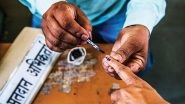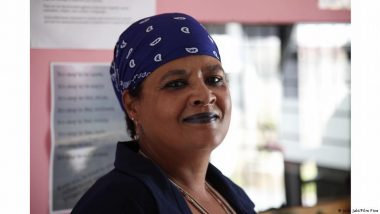Murder, violence, drug abuse is commonplace across poverty-stricken South Africa. In her documentary "Dorpie," director Julia Jaki accompanied a street worker as she fights to protect women from gender-based brutality."You are safe now," street worker Lana O'Neill says, as she comforts a young girl named Shakira, whom she found under a bridge in a slum — where "a lot of bad things happen."
Also Read | World News | Five Injured in Nepal Helicopter Crash.
Shakira is barely responsive, having taken a drug known as "tik" — stretched crystal meth — as Lana brings her to a safe house.
Also Read | Latest News | SJVN Bags 100 MW Solar Power Project in Rajasthan.
"When was the last time you bathed?" asks Lana. "A few months ago, auntie," Shakira replies dazedly. "Okay, you take a bath now, get something to eat and then go to sleep, and tomorrow we'll talk about what to do next," says Lana.
Hanging out in the squatter camp
The scene from the film "Dorpie" is not fiction, but real.
This is everyday life in Bredasdorp, a small town in South Africa, about 180 kilometers (112 miles) southeast of Cape Town. Tourists visiting the famous Garden Route sometimes stop here to admire the picturesque town center with its buildings once built by the Boers and the beautiful white church.
The "squatter camp," as poor quarters are often referred to in South Africa, lies behind the railway tracks. Foreigners do not stray here.
But this is exactly where Lana O'Neill works. Since 2003, she has been working for the marginalized in society. She goes to the huts of the poor, brings medicine and food, collects young girls who prostitute themselves or take drugs at the roadside.
In the safe house, she has created a refuge for them.
There are firm rules there. "We don't swear, we don't shout. No drugs, no alcohol, no men visiting." A clear statement. Fluksie, Zana, Jo-Marie, Koekie and Shakira are just a few of the girls who have found refuge here with Lana over the years.
'A vicious circle'
The better society of Bredasdorp thinks that the people in the "squatter camp" only have themselves to blame for their situation. "But it is of course due to the circumstances," Lana tells DW. "You just have to look at how they grow up — without proper family structures, exposed to domestic violence and sexual abuse. How can you help such traumatized people to change their lives? It's a vicious circle."
Lana knows what she is talking about. She was sexually abused herself when she was aged 11. "I know that pain, but I was able to work through it," she says, "because I had the support of my family. I didn't take refuge in drugs. The girls and women here have no one to help them." If only everyone would get out of their comfort zone and tackle the problem together, "this small town" — or even South Africa as a whole — would change for the better, Lana argues.
Lana has already cared for around 500 girls and women at the safe house, 80% of whom, she says, were abused by family members. "But no one wants to talk about it, everyone looks the other way."
There are many 'Dorpies' in South Africa
The bleak situation in Bredasdorp is not an isolated case, says German director Julia Jaki, who filmed Lana O'Neill at work for six years.
The title of her documentary, "Dorpie," means "small town," and "Bredasdorp basically stands for many small towns in South Africa," says Jaki. "In the nicer, more affluent part live mostly whites, in the squatter camp live people of color — and this is 25 years after the end of apartheid."
Big words end up as empty promises
Murder and rape rates in South Africa are among the highest in the world, and the locals have become used to it. Bredasdorp, however, made international headlines when 17-year-old Anene Booysen was raped and murdered. Julia Jaki suspects that the reason Booysen's death received so much attention was because her abdomen had been slashed and her intestines ripped out.
At the time, there were protest marches all over the country, and politicians promised to do everything to prevent such things from happening in the future. A year after the crime, Jaki went to Bredasdorp to see if anything had changed in the village — if young people were now getting regular support from the state. The answer is swift and clear: no.
But the director met Lana O'Neill: "My first question to her was, of course, 'How do you feel about me coming as an outsider and making a film about you, accompanying your work?'"
Lana liked the idea. She knows many Bredasdorp citizens are tired and annoyed by her constant pleas for help. In the affluent part of town, they don't feel responsible. "But I'm not here to please everyone, I'm here to help," she says. After all, the "Anene Booysen Skills Center" was opened, but it did not last and today it stands empty.
Shortly after Jaki met Lana for the first time, another girl was murdered, and two more during the filming. In the film, the sentence is uttered: "Bredasdorp is known as a murder town." In tears, the coffin of a young person is lowered into the ground, the bells ring, but then everything goes on as before, and nothing changes.
Lana O'Neill does not give up. She organizes a demonstration in front of the town hall to alert city officials. With big words, the deputy mayor thanks them for their commitment: "Thank you for opening our eyes," she says and promises to help.
But nothing happens, once again.
In another key scene, there is a meeting of the deputy justice minister with the families of two murdered girls. He, too, brandishes big words in front of the camera; but the promised support in solving the case has not been delivered to date. "It is perhaps in the nature of a politician to perform, to make promises and not keep them," says Jaki. This is exactly the experience Lana O'Neill has almost daily.
'What if right now a girl is raped?'
Sometimes Lana contemplates quitting and just being there for her family.
But work is her life, and her husband and children fully support her endeavors. And that's how she wants to carry on. "As long as I live... I can't help it," she tells DW. "I already feel guilty because I'm talking to you on the phone and I don't want to be disturbed. What if right now a girl is raped and they need me?"
The street worker thinks it is good that Jaki's documentary film "Dorpie" is now being shown in Germany; she hopes it will bring support from abroad.
"For me it was important," says the director, "that someone like Lana comes into the spotlight, that people see that there are people who do an incredible amount. But they should also see where the failures lie — in the structures and the people who are responsible for them."
This article was originally written in German.
(The above story first appeared on LatestLY on May 05, 2023 05:10 PM IST. For more news and updates on politics, world, sports, entertainment and lifestyle, log on to our website latestly.com).













 Quickly
Quickly


